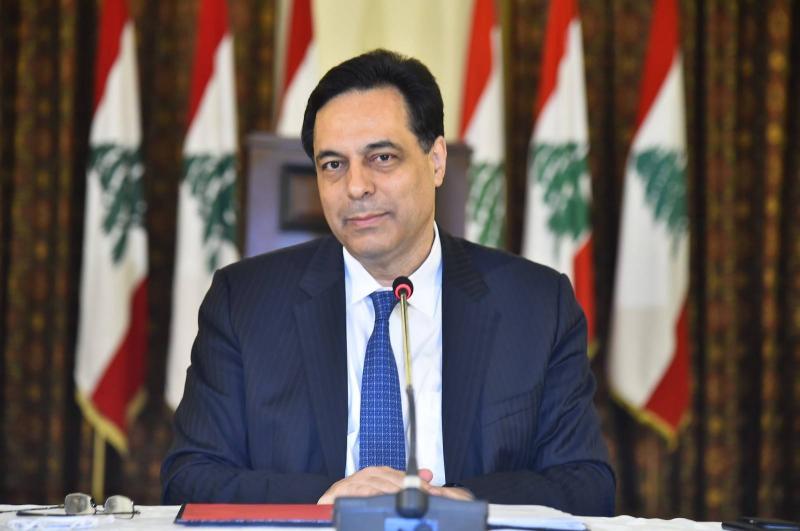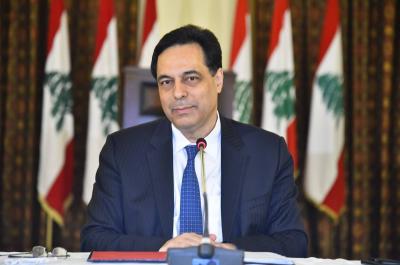The Lebanese caretaker Prime Minister, Hassan Diab, affirmed on Wednesday that his country has become "in the midst of grave danger," urging brotherly and friendly countries to support Lebanon and save it "before it's too late." In a press conference, Hassan Diab stated that Lebanese citizens "are burning in the fire of prices that exceed their incomes, fostering their frustration and pushing some to seek hope far away from their homeland, which loses daily its scientific competencies and youth."
He added: "Today, the vicious cycle surrounds hopes of finding a way out of the predicament that has become a national crisis threatening what remains of the state's components, the constitution, and institutions. However, the danger lies in the negative repercussions the crisis leaves on the daily lives of Lebanese people."
Diab continued: "The financial situation, beset by accumulated errors in financial policies and for which we laid out a roadmap for recovery in the plan adopted by our government, and which we began negotiating with the International Monetary Fund based on it, halted with the government's resignation. We need a government today to negotiate with the Fund to exit the severe crisis."
The caretaker Prime Minister referred to the latest report issued by the World Bank about the situation in Lebanon, saying: "Today we are faced with a difficult reality reflected by the World Bank in its report a few days ago, which stated that Lebanon is sinking in economic collapse, with no perspective for a solution to pull it out of a deteriorating situation exacerbated by a political paralysis."
### "Facts" Illustrating What is Happening
Diab narrated a series of "facts" that he believes confirm what the World Bank stated in its report, which include:
1. Failure to form a new government to tackle pressing financial, social, living, and economic problems.
2. Political forces not rising to the level of national responsibility, and a lack of understanding of the magnitude of the crisis and its repercussions.
3. Continuation of the halt in negotiations with the International Monetary Fund.
4. Continued freeze on the recovery plan established by his government.
5. The Central Bank of Lebanon reducing the allocations for importing essential materials.
6. A shortage of medicines, baby milk, and fuel, due to some merchants resorting to stockpiling basic materials.
7. The persistence of smuggling through various means and for different essential materials, despite efforts to confront smuggling in all its forms.
8. A deterioration in meeting the minimum social, service, and medical requirements of the Lebanese.
9. A severe drain of scientific and human resources.
10. A complete external blockade on Lebanon and the enactment of various pressures to prevent assistance from reaching it, pushing it towards total collapse.
### Strong Warning
Diab stressed that these realities "make the internal conditions on the brink of collapse, which will make the Lebanese the victims, while political forces will rise again to present themselves as saviors for the people and the country." He added: "If the collapse occurs, it will have serious implications for the Lebanese and the residents on its soil, as well as for the brotherly and friendly countries by land or sea... and no one will be able to control what the sea may bring in terms of waves."
At the end of the conference, the Lebanese caretaker Prime Minister issued "two calls," one to the Lebanese and another to "the brothers of Lebanon." He said: "I urge the Lebanese to be patient with the injustice they suffer or that may affect them from any decisions that any party may make... This stage requires the highest levels of responsibility to mitigate the pains of collapse if it happens."
He added: "I call on the political forces to make concessions, no matter how small they may seem, because they alleviate the suffering of the Lebanese and halt the frightening trajectory. Forming a government nearly ten months after ours is a priority that supersedes any other goal or title. Fear God regarding the people who are paying hefty prices without guilt."
The second call was directed to "the friends of Lebanon." Diab said: "I urge them not to hold the Lebanese accountable for burdens they bear no responsibility for. The people expect their brothers and friends to stand by them and assist them in their ordeal, and do not expect them to stand idle in the face of their suffering or to contribute to deepening it."
He concluded his remarks by saying: "I appeal to brothers and friends... Lebanon is in the midst of grave danger. Either save it now before it's too late, or regretting it later will be of no use."




